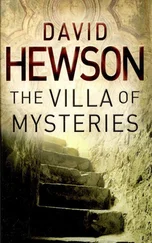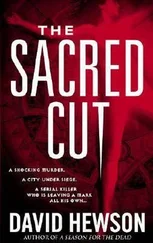Angelo had passed on his secrets with a cunning, certain deliberation. The memory of his father’s face in those last moments—skull-like, grinning, knowing—stayed with Uriel always, taunting, awaiting the time when Angelo’s son would fail, as every omo de note did because theirs was an imprecise art, one which could be destroyed by an extra milligram of soda or a slight shift in the searing 1400-degree heat of flaming wood and gas. Even so, Uriel had memorised the formulae, repeating them constantly, burning them into his synapses, swearing that a day would come when he would find the courage to defeat the demon of his father’s last admonition: Never write these down, or the foreigners will steal from you. He was still waiting. Just the thought now, long after his father had turned to dust, made him sweat all the more heavily beneath the heavy tan furnace apron he wore over an old, tattered cotton suit.
That time would come. Until it did, the litany of recipes would race through his brain unbidden, unwanted, when he woke up, head throbbing from drink, in the blazing light of their apartment in the mansion. On those rare occasions he wrestled with Bella on the old, creaky brass bed, trying to find some other kind of secret in his wife’s hot, taut body, wondering why this was now the only way they could converse.
“Bella,” he murmured to himself, and was shocked how aged and dry his own voice sounded. Uriel Arcangelo was forty-seven. A lifetime of working nights in the furnace, the cursed, beloved furnace, feeling the fire break the veins of his hardening cheeks, gave him the complexion and the dull, depressed outlook of an old man.
“What is this?” he now yelled angrily to no one. He heard only the furnace’s animal roar in return.
He understood this fiery beast better than any man. He’d grown up with it, fought for hours to control its tantrums and its sulks. He knew its many moods: none better than the long, torpid hours in which it refused to come to temperature. It had never overheated before. The fabric of decrepit iron and brick was too insubstantial, leaked out too much expensive energy through its cracked pores.
A thought entered Uriel Arcangelo’s head. He’d been burned many times in the furnace. Once he nearly lost an eye. His hearing was bad, his sense of smell ruined. But there’d never been a blaze. A real blaze, the kind that had put rival furnaces out of business. That meant the Arcangeli were lax when it came to precautions. They’d never followed the fire department’s orders to the letter. It was always cheaper to send round the bribe than carry out the repairs.
The hose was outside, attached to the exterior wall of the foundry, a curling snake of dusty pipe. There wasn’t even so much as an extinguisher close by.
Uriel coughed. There was smoke in the miasma issuing from the furnace, a foreign smell too. Not thinking, doing this because it was, simply, what came naturally, he took out the flask of grappa, knocked back a swig, clumsily, aware that a dribble of the harsh liquid had spilled down his front, staining the bib of his brown apron.
She’d know. She’d sniff and she’d look at him, that Bracci look, the cruel grimace of hatred and despair that spoiled her features so often these days.
A noise emerged from the heart of the furnace. It was a sound that Uriel had never heard before, not from gas or wood or glass. A soft, organic explosion sent a shower of sparks flying out of the structure’s angry orange mouth. The lights danced in dusty reflections across the ceiling. The sirocco roared and shook the foundry as if it were a dried seed head shaking in the wind.
Uriel Arcangelo took out his own set of keys, walked back and placed the right one in the old mortise, just in case he needed to make a quick exit.
The furnace needed help. Perhaps it was more than one man could manage. If that was the case, he had, at least, a swift route of escape, out to the quay and the house beyond the palazzo, where the rest of them now slept, unaware of this strange event shaping just a few metres away on their private island.

THEY CALLED PIERO SCACCHI THE GARZONE DE NOTE, but in truth he was no boy at all. Scacchi was forty-three, a hulk of a man with the build and demeanour of the peasant farmer he was during the day, out on the low, green pastures of Sant’ Erasmo, the farming island of the lagoon that provided Venice with fresh vegetables throughout the year. These days, his hard-won crops of artichokes, Treviso radicchio, and bright red bunches of peperoncini were insufficient. So, some months before, reluctantly accepting there was no alternative, he had approached the Arcangeli, spoken to the boss of the clan, Michele, and offered his labour at a rate he knew would be hard to refuse.
It was common knowledge the Arcangeli were short of money. The pittance they bargained him down to was insignificant, even when paid in cash to circumvent the taxmen. But it was simple work, with flexible hours: picking up wood and ash from farmers and small suppliers dotted around the lagoon, transporting it to the family’s private island that hung off the southern edge of Murano like a tear about to fall. It entailed a little moving, a little cleaning, and the occasional illegal disposal of rubbish. The work kept Piero Scacchi on the water, a place both he and his dog liked, far away from Venice with its dark alleys and darker human beings. He’d grown up in the lagoon, on the farm his mother had bequeathed to him a decade before. When Scacchi was there, or in his boat, he felt he was home, safe from the city and its dangers.
Like him, the Arcangeli were different, but this bond never seemed to bring them closer. The family was insular, silent, in a way which Scacchi found sad and, at times, almost sinister. In spite of his solitary life, or perhaps because of it, he was a talkative man, outgoing, fond of a drink and a joke with his peers. He never sailed home from the early morning market trips to the Rialto entirely sober. Piero Scacchi knew how to be sociable when it suited him. These talents were entirely wasted once the Sophia navigated beneath the narrow iron bridge that linked the private island the clan called the Isola degli Arcangeli—an artificial name Piero found pretentious—and moored at the small jetty between the palazzo and the house, Ca’ degli Arcangeli, where they lived, rattling around like pebbles in its echoing, dusty corridors.
The family’s story was well known. They’d come from Chioggia under the reign of their late father, taken over the glass business, tried to turn back the clock and persuade a dubious world that it was worth paying double—or more—for a mix of traditional and experimental work that seemed out of place alongside the rest of Murano’s predictably gaudy offerings. The early years of novelty and success, under Angelo Arcangelo, were long past. Rumour had it the Arcangeli would go bankrupt soon or be bought out by someone with half a business brain. Then Piero Scacchi would be looking for more work on the side again. Unless there was a sudden rise in the market price of peperoncini . Or some other kind of miracle.
He pulled his collar tighter around his neck to keep out the dusty wind, then groaned at the sight of the animal. It was lying pressed flat to the planks of the motor launch, face buried beneath its soft, long black ears, quivering.
“Don’t look so miserable. We’ll be home soon.”
The creature hated the foundry. He’d called the dog Xerxes because it was the master, the general of the lone and desolate places they hunted together. The stink of the furnace, the smoke, the roar of the flames above . . . everything now seemed designed to instil foreboding into its keen, incisive black head. Out on the island, or in the marshland of the lagoon, hunting for ducks downed by Scacchi’s ever-accurate shotgun, the dog was in its element, fearlessly launching itself into chill brown sludge to retrieve the still-warm body of some wildfowl lost to view in the marram grass and tamarisk trees of the islets. Here it cowered constantly. Scacchi would have left it at the farm if only the dog would allow it. Just the sound of the boat’s asthmatic engine was enough to send it into raptures. Animals had little understanding of consequences. For Xerxes, every action was a prelude to possible delight, whatever past experience dictated to the contrary. Scacchi envied the spaniel that.
Читать дальше













